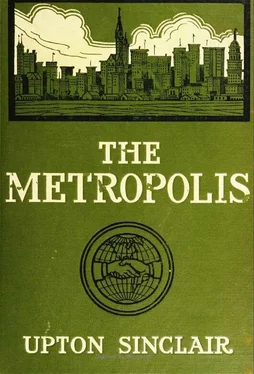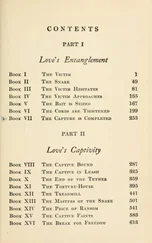Upton Sinclair - The Metropolis
Здесь есть возможность читать онлайн «Upton Sinclair - The Metropolis» весь текст электронной книги совершенно бесплатно (целиком полную версию без сокращений). В некоторых случаях можно слушать аудио, скачать через торрент в формате fb2 и присутствует краткое содержание. Год выпуска: 1908, Издательство: New York, Moffat, Yard & company, Жанр: Старинная литература, на английском языке. Описание произведения, (предисловие) а так же отзывы посетителей доступны на портале библиотеки ЛибКат.
- Название:The Metropolis
- Автор:
- Издательство:New York, Moffat, Yard & company
- Жанр:
- Год:1908
- ISBN:нет данных
- Рейтинг книги:5 / 5. Голосов: 1
-
Избранное:Добавить в избранное
- Отзывы:
-
Ваша оценка:
- 100
- 1
- 2
- 3
- 4
- 5
The Metropolis: краткое содержание, описание и аннотация
Предлагаем к чтению аннотацию, описание, краткое содержание или предисловие (зависит от того, что написал сам автор книги «The Metropolis»). Если вы не нашли необходимую информацию о книге — напишите в комментариях, мы постараемся отыскать её.
The Metropolis — читать онлайн бесплатно полную книгу (весь текст) целиком
Ниже представлен текст книги, разбитый по страницам. Система сохранения места последней прочитанной страницы, позволяет с удобством читать онлайн бесплатно книгу «The Metropolis», без необходимости каждый раз заново искать на чём Вы остановились. Поставьте закладку, и сможете в любой момент перейти на страницу, на которой закончили чтение.
Интервал:
Закладка:
Bertie's chef and servants were on board, and a supper was ready in the dining-car, which they ate while watching the Hudson by moonlight. And the next morning they reached their destination, a httle station in the mountain wilderness. The train lay upon a switch, and so they had breakfast at their leisure, and then, bundled in furs, came out into the crisp pine-laden air of the woods. There was snow upon the ground, and eight big sleighs waiting; and for nearly three hours they drove in the frosty sunlight, through most beautiful mountain scenery. A good part of the drive was in Bertie's " preserve," and the road was private, as big signs notified one every hundred yards or so.
So at last they reached a lake, winding like a snake among towering hills, and with a huge baronial castle standing out upon the rocky shore. This imitation fortress was the "camp."
Bertie's father had built it, and visited it only half a dozen times in his life. Bertie himself had only been here twice, he said. The deer were so plentiful that in the winter they died in scores. Nevertheless there were thirty gamekeepers to guard the ten thousand acres of forest, and prevent anyone's hunting in it. There were many such "preserves" in this Adirondack wilderness, so Montague was told; one man had a whole mountain fenced about with heavy iron
Digitized by Microsoft®
railing, and had moose and elk and even wild boar inside. And as for the " camps," there were so many that a new style of architecture had been developed here — to say nothing of those which followed old styles, like this imported Rhine castle. One of Bertie's crowd had a big Swiss chalet; and one of the Wallings had a Japanese palace to which he came every August — a house which had been built from plans drawn in Japan, and by labourers imported especially from Japan. It was full of Japanese ware — furniture, tapestry, and mosaics; and the guides remembered with wonder the strange silent, brown-skinned httle men who had laboured for days at carving a bit of wood, and had built a tiny pagoda-like tea-house with more bits of wood in it than a man could count in a week.
They had a luncheon of fresh venison and partridges and trout, and in the afternoon a hunt. The more active set out to track the deer in the snow; but most prepared to watch the lake-shore, while the gamekeepers turned loose the dogs back in the hills. This "hounding" was against the law, but Bertie was his own law here — and at the worst there could simply be a small fine, imposed upon some of the keepers. They drove eight or ten deer to water; and as they fired as many as twenty shots at one deer, they had quite a lively time. Then at dusk they came back, in a fine glow of excitement, and spent the evening before the blazing logs, telling over their adventures.
The party spent two days and a half here, and on the last evening, which was Thanksgiving,
Digitized by Microsoft®
they had a wild turkey which Bertie had shot the week before in Virginia, and were entertained by a minstrel show which had been brought up from New York the night before. The next afternoon they drove back to the train.
In the morning, when th^^ reached the city, Alice found a note from Mrs. Winnie Duval, begging her and Montague to come to lunch and attend a private lecture by the Swami Babuba-nana, who would tell them all about the previous states of their souls. They went — though not without a protest from old Mrs. Montague, who declared it was "worse than Bob IngersoU."
And then, in the evening, came Mrs. de Graffenried's opening entertainment, which was one of the great events of the social year. In the general rush of things Montague had not had a chance properly to realise it; but Reggie Mann and Mrs. de Graffenried had been working over it for weeks. When the Montagues arrived, they found the Riverside mansion — which was decorated in imitation of an Arabian palace — turned into a jungle of tropical plants.
They had come early at Reggie's request, and he introduced them to Mrs. de Graffenried, a tall and angular lady with a leathern complexion painfully painted; Mrs. de Graffenried was about fifty years of age, but like all the women of Society she was made up for thirty. Just at present there were beads of perspiration upon her forehead; something had gone wrong at the last moment, and so Reggie would have no time to show them the favours, as he had intended.
Digitized by Microsoft®
About a hundred and fifty guests were invited to this entertainment. A supper was served at little tables in the great ballroom, and afterward the guests wandered about the house while the tables were whisked out of the way and the room turned into a playhouse. A company from one of the Broadway theatres would be bundled into cabs at the end of the performance, and by midnight they would be ready to repeat the performance at Mrs. de Graffenried's. Montague chanced to be near when this company arrived, and he observed that the guests had crowded up too close, and not left room enough for the actors. So the manager had placed them in a little anteroom, and when Mrs. de Graffenried observed this, she rushed at the man, and swore at him like a dragoon, and ordered the bewildered performers, out into the main room.
But this was peering behind the scenes, and he was supposed to be watching the play. The entertainment was another "musical comedy" like the one he had seen a few nights before. On that occasion, however, Bertie Stuyvesant's sister had talked to him the whole time, while now he was let alone, and had a chance to watch the performance.
This was a very popular play; it had had a long run, and the papers told how its author had an income of a couple of hundred thousand dollars a year. And here was an audience of the most rich and influential people in the city; and they laughed and clapped, and made it clear that they were enjoying themselves heartily. And what sort of a play was it ?
Digitized by Microsoft®
j»
It was called "The Kaliph of Kamskatka It had no shred of a plot; the Kaliph had seventeen wives, and there was an American drummer who wanted to sell him another — but then you did not need to remember this, for nothing came of it. There was nothing in the play which could be called a character — there was nothing which could be connected with any real emotion •ever felt by human beings. Nor could one say that there was any incident — at least nothing happened because of anything else. Each event was a separate thing, like the spasmodic jerking in the face of an idiot. Of this sort of "action" there was any quantity — at an instant's notice everyone on the stage would fall sim,ultane-ously into this condition of idiotic jerking. There was rushing about, shouting, laughing, exclaiming; the stage was in a continual uproar of excitement, which was without any reason or meaning. So it was impossible to think of the actors in their parts; one kept thinking of them as human beings — thinking of the awful tragedy of full-grown men and women being compelled by the pressure of hunger to dress up and paint themselves, and then come out in public and dance, stamp, leap about, wring their hands, make faces, and otherwise be "lively."
The costumes were of two sorts: one fantastic, supposed to represent the East, and the other a kind of redtictio ad absurdum of fashionable garb. The leading man wore a "natty" outing-suit, and strutted with a little cane; his stock in trade was a jaunty air, a kind of perpetual flourish, and a wink that suggested the cunning of a
Digitized by Microsoft®
satyr. The leading lady changed her costume several times in each act; but it invariably contained the elements of bare arms and bosom and back, and a skirt which did not reach her knees, and bright-coloured silk stockings, and slippers with heels two inches high. Upon the least provocation she would execute a little pirouette, which would reveal the rest of her legs, surrounded by a mass of lace ruffles. It is the nature of the human mind to seek the end of things; if this woman had worn a suit of tights and nothing else, she would have been as uninteresting as an underwear advertisement in a magazine; but this incessant not-quite-revealing of herself exerted a subtle fascination. At frequent intervals the orchestra would start up a jerky little tune, and the two "stars" would begin to sing in nasal voices some words expressive of passion; then the man would take the woman about the waist and dance and swing her about and bend her backward and gaze into her eyes — actions all vaguely suggestive of the relationship of sex. At the end of the verse a chorus would come gliding on, clad in any sort of costume which admitted of colour and the display of legs; the painted women of this chorus were never still for an instant — if they were not actually dancing, they were wriggling their legs, and jerking their bodies from side to side, and nodding their heads, and in all other possible ways being "lively."
Читать дальшеИнтервал:
Закладка:
Похожие книги на «The Metropolis»
Представляем Вашему вниманию похожие книги на «The Metropolis» списком для выбора. Мы отобрали схожую по названию и смыслу литературу в надежде предоставить читателям больше вариантов отыскать новые, интересные, ещё непрочитанные произведения.
Обсуждение, отзывы о книге «The Metropolis» и просто собственные мнения читателей. Оставьте ваши комментарии, напишите, что Вы думаете о произведении, его смысле или главных героях. Укажите что конкретно понравилось, а что нет, и почему Вы так считаете.












